“Madness is the result not of uncertainty but of certainty.”-Friedrich Nietzsche
Why is it that some people who have a lot of talent and intelligence do not become successful?
Many of us have friends or family who seemed to be bright and full of plans. But they end up resigning themselves to a life that they did not foresee or did not wish for.
We may have also seen friends or acquaintances or heard about famous people who surprised the world with their resilience and their success. Often, the world wrote off some of these people and did not expect them to succeed.
Paul McCartney and George Harrison were in the same class together in Liverpool in the 1950’s and went through their entire education with no one recognizing their musical genius or talent.
Dr. Seuss was rejected 27 times and one of the rejection letters he received for his first children’s story titled To Think I saw it on Mulberry Street said the following (reference: The Making of a Bestseller: From Author to Reader By Arthur T. Vanderbilt):
“Too different from other juveniles on the market to warrant its selling.”
His writing style was also rejected as being nonsensical and silly. Imagine the uncertainty and the self-doubt that would induce.
Elvis Presley was not allowed in the Glee club at Tupelo, Mississippi. Presley was said that he would ruin their sound.
What is the secret sauce that makes some people fold in and give up while it makes other people driven and purpose filled?
Is it environment or is it something that they have within them?
How is it possible that some people overcome overwhelming odds and navigate their worlds with mastery?
Why is it that some people do not even try to launch their best while others do not rest till they strive for excellence?
While many factors go in for creating an exceptional life, some of the most often overlooked ones are how to navigate uncertainty and self-doubt.
Uncertainty and doubt exist for everyone but it seems that many of us are ill prepared to navigate their ups and downs.
One of the famous experiments that speak to delaying instant gratification is the famous Stanford marshmallow experiment by Walter Mischel.
I believe that the experiment also shows willpower and staying with the discomfort of uncertainty.
Children had an option between getting a marshmallow in the present or getting two at a later on time. It does not come as a surprise that many children opted for the former choice.
Some children managed to have better self-control by choosing the two marshmallows later. This required a delay of gratification and ability to redirect focus on other activities.
These were the children who managed to postpone their immediate desire for one that gave prolonged benefits.
This impulse control group included children with better life outcomes as adults. They did better in different measures such as educational outcomes, maintaining friendships and dealing with stress.
This experiment speaks towards will power and self-control. I believe that it also shows the important quality of being able to self-soothe and manage uncertainty in the present.
The choice of getting a certain marshmallow now or the uncertainty of getting two later on is a choice we often face in life.
The two marshmallows become additional risks, uncertainty and future tasks.
We allow ourself make a quick and safe decision at the moment.
Or we decide to take the riskier option of delaying gratification and staying with the problem.
There is risk in uncertain moments that triggers the fight and flight response and anxiety loops in the mind and body.
Uncertainty with no less certainty has the power of driving even the most rational of us nuts with anxiety.
Coupled with fear and self-doubt, I do not find it surprising that many of us quit at the face of uncertain ideas.
We weigh our options and stick with the safe choice of what we know.
But there is no adventure in certainty. If your life is tightly scripted according to a master plan, you may be missing out on the adventure of an uncertain path.
How can we make the path to navigating the rough seas of uncertainty easier to manage?
Here are a few ideas:
1. The Art Of Living In The Question
“Have patience with everything that remains unsolved in your heart. …live in the question.” ― Rainer Maria Rilke, Letters to a Young Poet
This is a difficult task for many of us because we want quick answers and instant solutions. When things do not work out as planned, we panic. This panic of uncertainty can express itself as:
- Tiredness
- Boredom
- Anger
- Irritation
- Fear and Anxiety
- Unclear path ahead
- Excuses
Ask yourself the important question if you are willing to go deeper into and live within the question as Rilke suggests.
Allow yourself the patience to marinate unsolved questions to get deeper answers. Remain with the question instead of seeking a quick fix.
When you ask the right questions and go deep in their understanding and unraveling, you can make great strides.
“The beginning of knowledge is the discovery of something we do not understand.” -Frank Herbert
2. Allow Yourself to Unburden The Control Issues
“Only I wasn’t steering anything, not even myself.” ― Sylvia Plath, The Bell Jar
Uncertainty becomes unbearable when we have a lot of control issues and want results in a specific manner.
I have been writing, creating content and teaching for many years now. Whenever, I let go of the big picture and wanted things to work out in a certain way, I did not enjoy my work.
After many years, I realized what Plath was saying about not being able to steer anything with complete certainty.
I realized that I created templates and guidelines and plans of how things ought to go according to what I knew and liked.
But beyond that, I was not in any definite control of how my content and writing would be received and perceived.
I could work on my sphere of influence like practicing more and going for excellence. But beyond that the future was always unknown and uncertain.
In fact, my most popular posts and presentations have been ones that I did not even consider crafting.
My Slideshare on Excuses has upwards of 113k views and my infographic on perfectionism has had many ongoing requests for download.
These were not the pieces of content that I thought would become popular. Please send me a message here if you would like to download a high quality pdf version and I will be happy to send it to you.
Of course, my point here is not to highlight or boast about my work but a request to simply put your work out there without too much expectation, control and self-doubt.
3. The Doubt And Uncertainty Thermostat
“We demand rigidly defined areas of doubt and uncertainty!” ― Douglas Adams, The Hitchhiker’s Guide to the Galaxy
I discussed the happiness thermostat and the upper limit problem in previous posts. I believe that uncertainty also has a thermostat.
When the discomfort and risk of uncertainty crosses that invisible red line of our thermostat, we get unsettled.
An invisible and intangible switch goes off and you want to come back to your zone of comfort.
This is the reason why you may have that great idea but when it comes to make actionable business plan, you delay and make excuses. This discomfort manifests itself in many ways but in the end it is successful in rationalizing away your great idea.
The ironic aspect of this is that it does not matter how much we know and learn, we are still not immune from the uncertainty upper limit.
If we are unwilling to take the risk and up the risk sensing thermostat, we can still get trapped in the comfort zone.
This is the reason why we see people taking all kinds of courses without much real forward motion. Do not underestimate the power and control of this inner “comfort zone” thermostat.
“Maturity, one discovers, has everything to do with the acceptance of not knowing.” ― Mark Z. Danielewski, House of Leaves
4. The Middle Ground
“As human beings, not only do we seek resolution, but we also feel that we deserve resolution. However, not only do we not deserve resolution, we suffer from resolution. We don’t deserve resolution; we deserve something better than that. We deserve our birthright, which is the middle way, an open state of mind that can relax with paradox and ambiguity.” ― Pema Chödrön, When Things Fall Apart: Heart Advice for Difficult Times
These soothing words from Ani Pema have always been a guiding light for me during times of uncertainty.
The discerning and judging mind demands resolution and certainty. The restless mind sees the world from the perspective of black and white, and complete and incomplete.
As Ani Pema suggests, we are better served with an open mind, a beginners mind that can relax into the uncertainty.
Neither are you too attached to the resolution or the outcome nor are you intent on the uncertainties of getting started.
Instead you develop a mind that is comfortable with being uncomfortable and uncertain of outcomes. This is possible through training and practice
5. The Uncertainty And Doubt Buster: Action
“So what do we do? Anything. Something. So long as we just don’t sit there. If we screw it up, start over. Try something else. If we wait until we’ve satisfied all the uncertainties, it may be too late. – Lee Iacocca
Chronic uncertainty always feels like an insurmountable mountain, a formidable foe, and a bottomless pit of despair.
Deep within the foundation of uncertainty and doubt are an erroneous perception, faulty expectation and a lack of action.
You imagine that things will go wrong and navigating the uncertainty feels overwhelming.
But when you take a small step, a tiny action, a leap forward you begin to realize that things are easier than they seemed like from a distance.
I remember the first time I learnt how to swim…
The first time I spoke to a room full of people…
The first time I decided to write regularly…
I was uncertain and afraid and overwhelmed. I had created a huge deal of all these events in my mind.
But when I took the first step in all these instances, it surprised me that it was not what I had made it out to be.
We create mental monsters all the time and the quickest way to slay the monster is to take action and find out for yourself.
“Our doubts are traitors, and make us lose the good we oft might win, by fearing to attempt.”― William Shakespeare
6. A Quick Way To Transcend Uncertainty and Doubt
“When in doubt, be ridiculous.” ― Sherwood Smith, Firebirds
Uncertainty, doubt and fear feed off a serious mood and the grave situation. They keep you locked in place in the limbo of resistance and the doldrums of similarity.
One of the quickest ways to make uncertainty and doubt more tolerable is to infuse some aspect of humor and silliness in it.
When you consider the hilarious options of navigating uncertainty, it will bring a smile to your face and make it easier to bear.
One of the uncertain elements in the beginning of my public speaking days was how my audience would perceive me. I remember the first public lecture that I had to give, I was nervous and the uncertainty was huge.
Minutes before I looked at myself in the mirror and took some deep breaths.
I looked at myself in different angles and from different perspectives. I realized that no matter what it was not so bad to look silly to other people.
That got a smile on my face to think that the audience consisted of people just like me. It also consisted of people who might be nervous to speak up with questions and comments.
Understanding the human condition and looking at yourself from the perspective of the audience helps you to change the perspective. It connects you with your audience, an important first step to navigate uncertainty of speaking.
The uncertainty that was a mental construct got deconstructed when I looked at myself in the mirror and confronted it.
Practice and rehearsal also helped me to simulate the uncertainty in the same environment that I would present.
“10% ago I was 90% unsure of what I didn’t want to do. Now I’m just 33.3% sure that I’m 66.6% unsure. And I can say this with .1% certainty.” ― Jarod Kintz, Seriously delirious, but not at all serious
7. Desiring Difficulty and Uncertainty: The Miracle Of Flow
“Although our intellect always longs for clarity and certainty, our nature often finds uncertainty fascinating.” ― Carl von Clausewitz
Humans can be complex and difficult to understand.
We may desire safety while hoping for adventure.
We may want easy solutions but out minds crave for complex problems to solve.
We may want to be experts but we long to have the beginners mind and learn more.
In the wonderful state of flow, there is some uncertainty and doubt built into the challenge.
When this challenge collides with our well-developed skills and practice at the edge of our abilities, we enter into the state of flow.
Flow can can induce intrinsic motivation and the state of timelessness. Refer to Mihaly Csikszentmihalyi’s research on flow states.
I believe that all challenges are uncertain in their outcome.
If things are certain than they stop to be a challenge. What makes you go for that difficult Sudoku puzzle is the possibility that you will be able to complete it. But you are well aware that you may not be able to complete it.
Getting stuck and being uncertain in this case and even in crossword and other puzzles have their inherent reward.
That is the reason why gamification is great for motivation.
Games rely on the idea that when things are going tough and the game is uncertain and ready to be over, you get a power up.
So do not dismiss all uncertainty as a source of discomfort to avoid. When you can effectively gamify and include uncertainty as a required component of the challenge, you begin to enjoy it.
Do not take my word for it. Look at all the millions who crave the uncertainty of a good game.
“For my part I know nothing with any certainty, but the sight of the stars makes me dream.” – Vincent van Gogh
8. Change The Approach To Uncertainty: Welcome It
“It’s not a terrible thing that we feel fear when faced with the unknown. It is part of being alive, something we all share.”-Pema Chodron
When you allow uncertainty as something that you can learn from and as part of life, you do not resist it anymore.
“The problem is not that there are problems. The problem is expecting otherwise and thinking that having problems is a problem.”- Theodore Rubin
When you realize that every person has doubts, fears and uncertainties, you feel the social proof of being able to transcend it and move forward.
“Worry does not keep it from raining tomorrow, but it does keep it from being sunny today.” ― Shannon L. Alder
9. Mining For Hidden Gems
“My voice is born repeatedly in the fields of uncertainty.” ― Terry Tempest Williams, When Women Were Birds: Fifty-four Variations on Voice
Taking the previous idea further, realize that uncertainty is the fertile field of possibility and beginnings.
Instead of dreading uncertainty:
- Welcome it.
- Learn to manage your anxiety better around uncertainty.
- Ask what are the lessons that you are learning by doubt and uncertainty.
- What feedback are you receiving and can you implement it to make things better.
- Can you use the energy of uncertainty to motivate you?
- Can you place the uncertainty in the proper context to fuel your desires and goals?
“What the caterpillar calls the end of the world, the master calls a butterfly.”- Richard Bach
10. The Uncertain Path Ahead
“There is stability in walking an uncertain path, because you never allow yourself to be misled by what you think you know.” ― A.J. Darkholme
While this may sound counter intuitive to you, there is more forward progress in remaining uncertain.
I believe that one of the cognitive biases that we all have is the idea that we know more than we actually do.
Even if we know a lot, putting that knowledge in the right context and connections makes all the difference.
When we too certain of our abilities, there is nothing more to learn and there is no room to grow.
My understanding is that even if we are experts in our niche, there is always something more to learn.
There is something new to integrate from different fields and even from our own niche. Moreover, there is no challenge and fun to know it all.
There is something quite wonderful about a state of the beginners mind and allowing uncertainty gives meaning to our common moments.
We become receptive to grow and learn and above all we ease into the moment and enjoy it, experience it and feel it.
“Doubt is an uncomfortable condition, but certainty is a ridiculous one.“- Voltaire
11. The Uncertainty And Doubt Of a Creative Life
“The unknown…the unforetold, the unproven, that is what life is based on. Ignorance is the ground of thought…The only thing that makes life possible is permanent, intolerable uncertainty: not knowing what comes next.” ― Ursula K. Le Guin
Perhaps the single most compelling reason why people do not think that they are creative is their inability or unwillingness of navigating creative uncertainty.
Every creative project is uncertain in the outcome.
This deep sense of discomfort of half finished manuscripts and empty canvases is what people hate. We like creativity to work like a math problem and always come to a clear conclusion but we know that is not how it works.
This all pervading doubt and uncertainty permeates creativity and the creative process.
The question then becomes: do you love to create as much or more than your hate of the uncertainty of the results and being in a state of doubt.
You have to push away the horizons of certainty and comfort and be willing to get adrift on the seas of uncertainty and self-doubt.
And out of that chaos and uncertain moments, you will see great moments of clarity and sunshine. These special moments will make the creative process well worth it.
This is difficult for most of us because it involves casting aside ego and what we know and trade it for vulnerability and the possibility of criticism.
“Creativity requires the courage to let go of certainties.“- Erich Fromm
In conclusion, how we navigate and embrace uncertainty and self-doubt might be more important than we previously thought.
We all strive to be happy and comfortable.
But paradoxically in the pursuit of that happiness, we confront a lot of uncertainty and self-doubt.
How you manage your uncertainty and how you make peace with things that go wrong might just determine your forward momentum and happiness.
“As far as the laws of mathematics refer to reality, they are not certain; and as far as they are certain, they do not refer to reality.” ― Albert Einstein



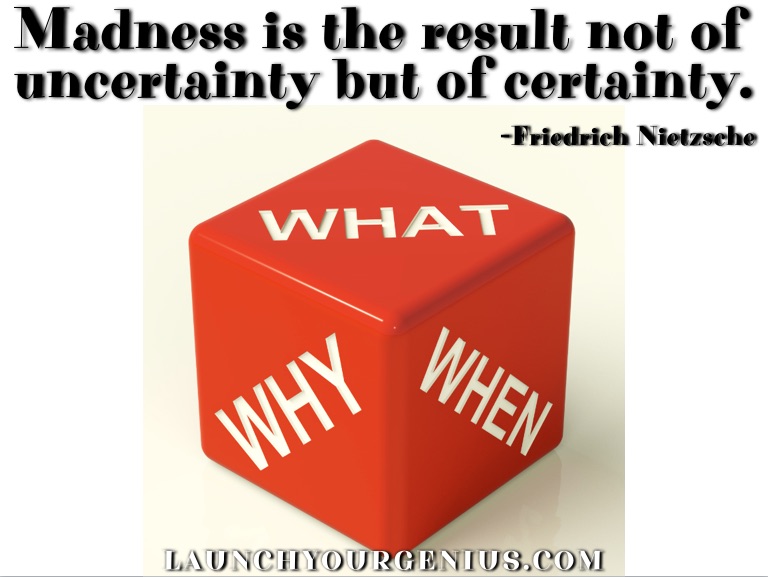

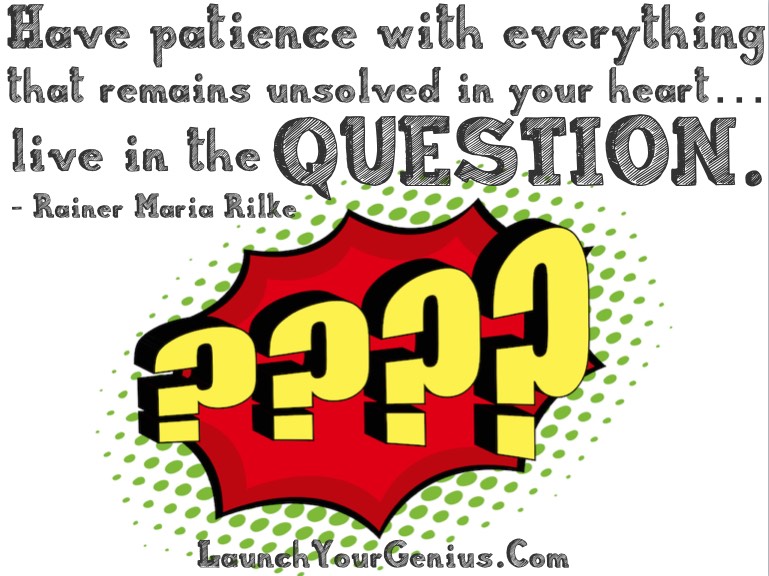
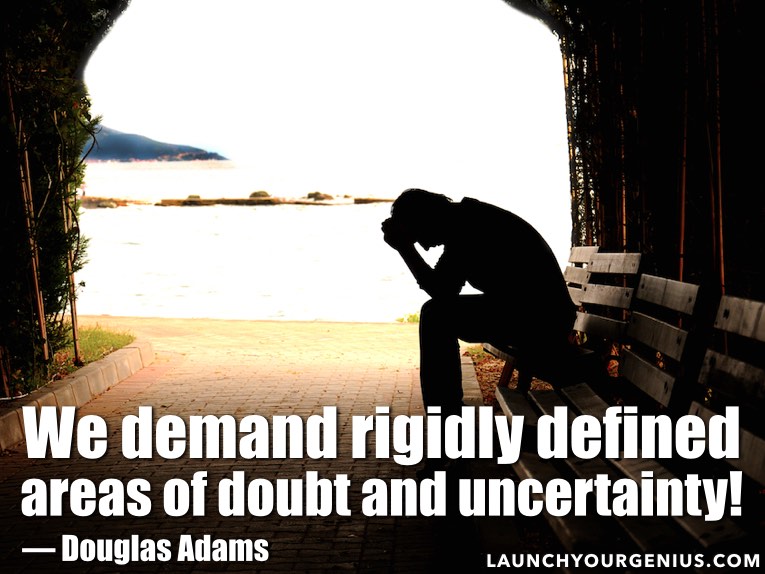

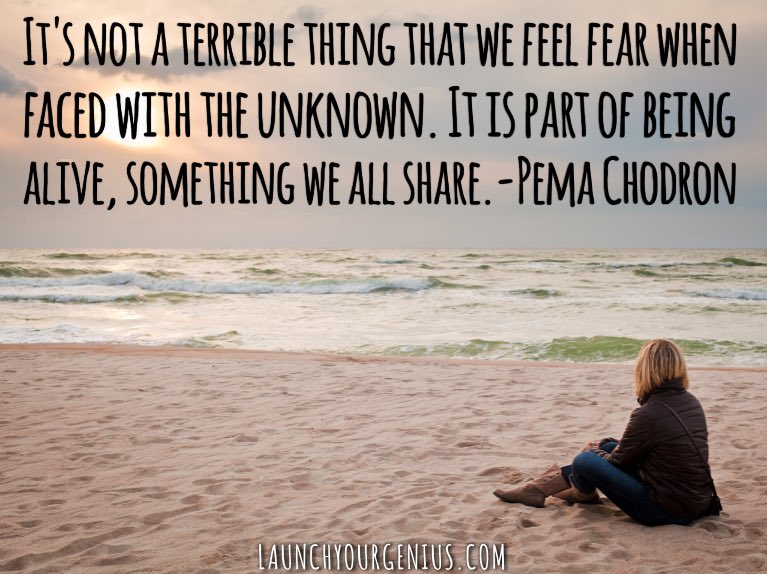
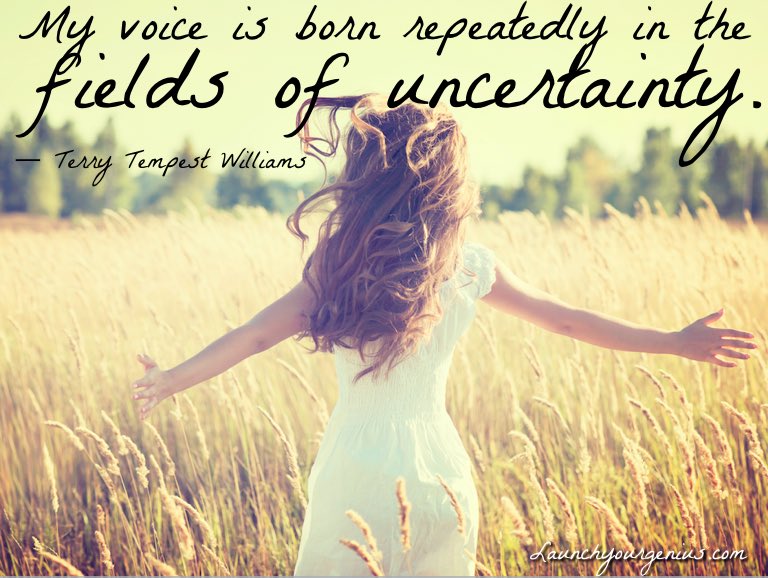

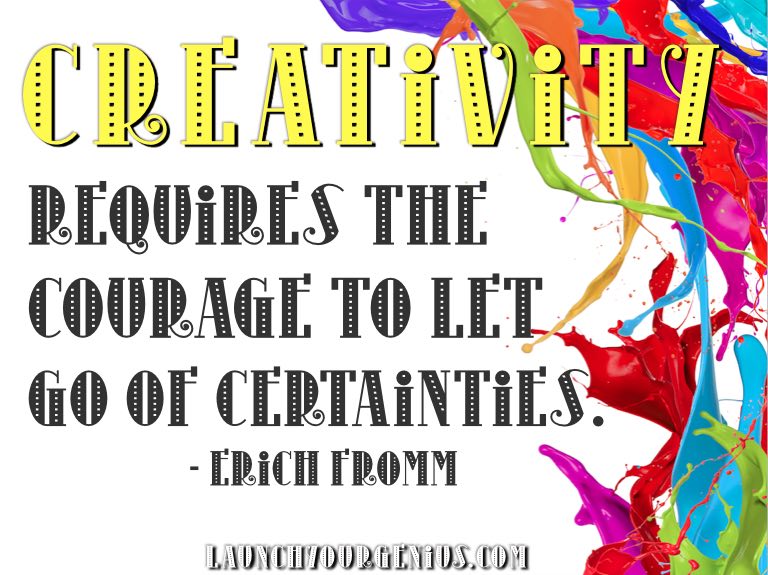

Comments